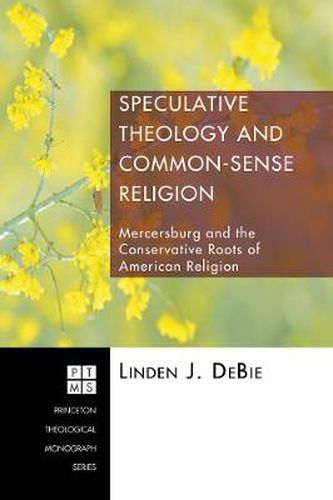Readings Newsletter
Become a Readings Member to make your shopping experience even easier.
Sign in or sign up for free!
You’re not far away from qualifying for FREE standard shipping within Australia
You’ve qualified for FREE standard shipping within Australia
The cart is loading…






This title is printed to order. This book may have been self-published. If so, we cannot guarantee the quality of the content. In the main most books will have gone through the editing process however some may not. We therefore suggest that you be aware of this before ordering this book. If in doubt check either the author or publisher’s details as we are unable to accept any returns unless they are faulty. Please contact us if you have any questions.
Evangelicals in nineteenth-century America had a headquarters at Princeton. Charles Hodge never expected that a former student of Princeton and his own replacement during his hiatus in Europe, John W. Nevin, would lead the German Reformed Church’s seminary in a new, and in his mind, destructive direction. The two, along with their institutions, would clash over philosophy and religion, producing some of the best historical theology ever written in the United States. The clash was broad, influencing everything from hermeneutics to liturgy, but at its core was the philosophical antagonism of Princeton’s Scottish common-sense perspective and the German speculative method employed by Mercersburg. Both Princeton and Mercersburg were the cautious and critical beneficiaries of a century of European Protestant science, philosophy, and theology, and they were intent on adapting that legacy to the American religious context. For Princeton, much of the new European thought was suspect. In contrast, Mercersburg embraced a great deal of what the Continent offered. Princeton followed a conservative path, never straying far from the foundation established by Locke. They enshrined an evangelical perspective that would become a bedrock for conservative Protestants to this day. In contrast, Nevin and the Mercersburg school were swayed by the advances in theological science made by Germany’s mediating school of theology. They embraced a churchy idealism called evangelical catholicism and emphatically warned that the direction of Princeton and with it Protestant American religion and politics, would grow increasingly subjective, thus divided and absorbed with individual salvation. They cautioned against the spirit of the growing evangelical bias toward personal religion as it led to sectarian disunity and they warned evangelicals not to confuse numerical success with spiritual success. In contrast, Princeton was alarmed at the direction of European philosophy and theology and they resisted Mercersburg with what today continues to be the fundamental teachings of evangelical theology. Princeton’s appeal was in its common-sense philosophical moorings, which drew rapidly industrializing America into its arms. Mercersburg countered with a philosophically defended, churchly idealism based on a speculative philosophy that effectively critiqued what many to this day find divisive and dangerous about America’s current Religious Right.
$9.00 standard shipping within Australia
FREE standard shipping within Australia for orders over $100.00
Express & International shipping calculated at checkout
This title is printed to order. This book may have been self-published. If so, we cannot guarantee the quality of the content. In the main most books will have gone through the editing process however some may not. We therefore suggest that you be aware of this before ordering this book. If in doubt check either the author or publisher’s details as we are unable to accept any returns unless they are faulty. Please contact us if you have any questions.
Evangelicals in nineteenth-century America had a headquarters at Princeton. Charles Hodge never expected that a former student of Princeton and his own replacement during his hiatus in Europe, John W. Nevin, would lead the German Reformed Church’s seminary in a new, and in his mind, destructive direction. The two, along with their institutions, would clash over philosophy and religion, producing some of the best historical theology ever written in the United States. The clash was broad, influencing everything from hermeneutics to liturgy, but at its core was the philosophical antagonism of Princeton’s Scottish common-sense perspective and the German speculative method employed by Mercersburg. Both Princeton and Mercersburg were the cautious and critical beneficiaries of a century of European Protestant science, philosophy, and theology, and they were intent on adapting that legacy to the American religious context. For Princeton, much of the new European thought was suspect. In contrast, Mercersburg embraced a great deal of what the Continent offered. Princeton followed a conservative path, never straying far from the foundation established by Locke. They enshrined an evangelical perspective that would become a bedrock for conservative Protestants to this day. In contrast, Nevin and the Mercersburg school were swayed by the advances in theological science made by Germany’s mediating school of theology. They embraced a churchy idealism called evangelical catholicism and emphatically warned that the direction of Princeton and with it Protestant American religion and politics, would grow increasingly subjective, thus divided and absorbed with individual salvation. They cautioned against the spirit of the growing evangelical bias toward personal religion as it led to sectarian disunity and they warned evangelicals not to confuse numerical success with spiritual success. In contrast, Princeton was alarmed at the direction of European philosophy and theology and they resisted Mercersburg with what today continues to be the fundamental teachings of evangelical theology. Princeton’s appeal was in its common-sense philosophical moorings, which drew rapidly industrializing America into its arms. Mercersburg countered with a philosophically defended, churchly idealism based on a speculative philosophy that effectively critiqued what many to this day find divisive and dangerous about America’s current Religious Right.